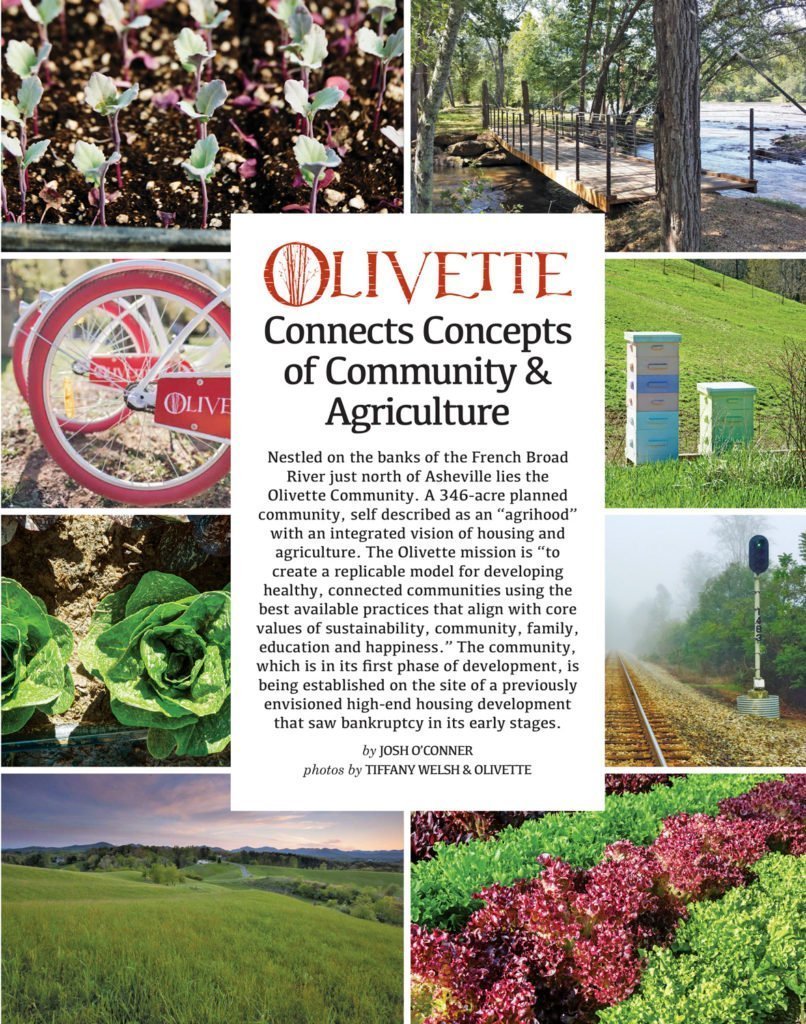
Josh O’Conner for Foodlife Magazine
THE OLIVETTE COMMUNITY is modeled in the vein of “Agrarian Urbanism”, an urban planning concept uniting agriculture and housing in order to maximize the economic, environmental, and social benefits associated with tightening the connection between people, their food, and farming. The concept has roots within the “New Urbanism” movement, an urban planning effort seeking to curb urban sprawl and create liveable, walkable communities that place residents closer to the urban amenities they use frequently. The idea of agriculturally-oriented residential development received attention locally with previously proposed housing developments, such as the original design concepts for Coggins Farm near Swannanoa; however, the Olivette Community is the first to take root.
Olivette Farm occupies a former family farm property adjacent to the main property, which the developers negotiated the purchase of as an addition to the site. “Olivette Farm is an integral part of the Olivette community”, says Farm Manager Justin Aiello, “As the neighborhood grows the farm will provide fresh produce for residents through our CSA program and through our farmstand.” The farm is attached directly to the neighborhood promoting a heightened visibility of agriculture. There is also an acre of the farm’s operation located within the center of the neighborhood ensuring that everyone that enters experiences the integration of farming within the community. Something Aiello envisions as providing families a place to grow immersed in the food world.
Aiello, who had been farming on land just west of Atlanta for three years prior to his transition to Olivette, has been at the helm for a little over a year. As self-proclaimed, “Landless Farmers,” he and his wife both wanted find a more permanent place to farm and put down roots and found themselves falling in love “with the laid-back, food-loving ways of Asheville”. He attributes his position at the farm to “good luck and good timing”. Having heard about the community and its plans to include a farm as an element of its plan, Aiello had the opportunity to meet with the developers and articulate his own ideas for the project, a presentation which lead to his current role, which he describes as his “dream job at his dream farm.”
The farm is “Certified Naturally Grown” and grows using organic practices (although it is not yet organic certified) backed by high standards of land stewardship. Among the practices incorporated into the farms land stewardship ethos are conservation tillage, integrated pest management, and no-spray crop production. The production focus on the farm centers on year-round production of a wide range of salad greens, salad vegetables (such as baby radishes, baby carrots, cherry tomatoes) and specialty produce for chefs. Aiello notes that the farm’s four-season production is unique to the area with just as many vegetables available and growing in January as there are July. The farm also offers Community Supported Agriculture (CSA) shares that allow customers to purchase subscriptions of the farm’s seasonal produce.
The farm has close relationships with ten different chefs and restaurants across Asheville providing them with high quality, farm fresh produce for their dishes. The farm also partners with Roots and Fruits Market in Black Mountain. As a partner, Olivette farm helped Roots and Fruits start the first winter farmers market in Black Mountain.
Olivette is also unique in its relationship with its neighbors, the residents of the Olivette Community. In addition to providing access to local foods, the farm is also an educational hub where residents can gain experience with agriculture. Aiello is clear that his top priorities are to connect residents with how and where their food is grown, educate the community on how to properly steward farmland, and also build a strong sense of community through the sharing of meals, workdays on the farm, and the CSA program. He underscores that experience stating, “In addition to providing produce for Olivette residents, we’ll also assist residents in planning and planting community garden plots, we’ll have educational gardening workshops, and host volunteer work days for those who want to get their hands dirty and learn more about farming. We’ll also be growing landscape plants for edible gardens throughout the neighborhood and for residents’ homes.”


Leave a Reply